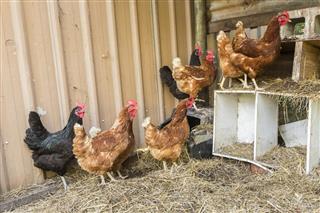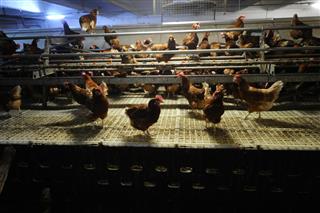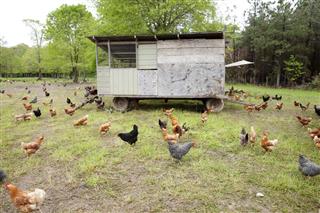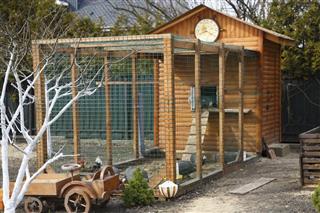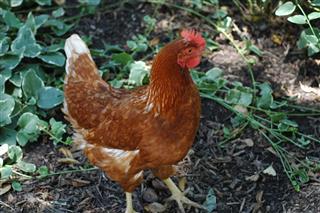
The Golden Comet chicken breed is one of the most popular ‘beginner varieties’ for first-time owners. These small-sized chickens are one of the best egg-laying breeds available. Here’s some interesting information about the Golden Comet chicken breed.
Did You Know?
Golden Comet chickens display difference in the sexes with color. While the males are generally white in color, the females are usually brownish-red!
The Golden Comet chicken breed is an unusual variety. They are a crossbreed between a White Rock hen and a rooster of the New Hampshire breed. This mix results in chicks whose sex is easy to tell apart due to the varying colors after they hatch. Generally, roosters make a lot of noise, and may not be allowed to be kept in certain localities. However, because it is easy to differentiate sexes in Golden Comets, such an owner can easily take in only the female chicks to breed.
Golden Comet chickens are known by many different names. One might also recognize them as Golden Buff, Red Star, Cinnamon Queen, and Gold Sex Link chickens. We’ll now look at some interesting facts about their appearance, behavior, habitat, maturity, reproduction, and the necessary care that needs to be taken when owning one or more of these unique birds.
Appearance
The Golden Comet chicken breed consists of birds of a small size, where the rooster weighs around 6 pounds, and hens weigh only about 4 pounds. The feathers are either whitish or golden or reddish-brown, depending on the gender. The birds usually grow only one comb on their heads, have a dull-yellowish beak, and have bright-yellow-orange eyes. The legs are either yellow or greenish in color.
Hardiness
Golden Comets are a very resilient chicken variety. Although they thrive the best in warmer climes, they easily adapt in all sorts of climates. As long as you provide enough hay for insulation inside the coop, the chickens can survive near freezing conditions. However, owners will need to regularly check humidity levels and the possibility of frost bite on the combs of these birds. In some cases medical attention might be required, because frostbite can turn fatal.
Behavioral Traits
This breed has a very relaxed attitude, and is very friendly towards humans and other chicken breeds. These birds are rarely seen fighting with other chickens. They usually don’t mind being held, and hence, are good for young children and people who are attempting to be a breeder for the first time. They are also naturally curious, and hence, the owners must supervise them regularly to keep the chickens away from danger.
How Many Eggs Do Golden Comet Chickens Lay?
Due to their small size, Golden Comets are not used for meat consumption. However, commercially, this is one of the most popular egg-laying breeds. Chickens start laying eggs when they are as young as 16 weeks. Initially, the size of the eggs are usually small. However, the size gradually increases as the hen becomes a full-grown adult. One can expect an egg each day from every bird, in their peak period.
You can make out that a hen is matured enough to lay eggs when the waddle and comb turn from pink to dark-red. The hens regularly lay eggs till they are around 2 years old, after which the number of eggs decrease gradually. This is the time when most commercial establishments have the hens replaced. Good shelter, food, and water will ensure that the size and quality of the large eggs with a mellow-brown egg color is maintained, and so is the rate of production. These hens are great egg layers, comparable to even the Rhode Island Red chicken.
Chicken Coop Considerations
A good shelter is very important in keeping the chickens healthy and increasing their lifespan considerably. Let’s look at the various facets of building a good chicken coop.
- Construction Material: If you have significant carpentry skills, this job will be much easier for you. Make sure that the material that you are using is not colored with lead paint, as this is toxic for the birds. Recycling old furniture in making the coop is a good idea to save you some money, and it is also environment-friendly.
- Selecting a Site: Choose a place that has partial shade, good drainage to protect from rains, and offers easy access for cleaning, providing food, and water. Ideally, the space should be able to occupy a coop that offers at least 6 sq. ft. for each bird.
- Walls and Floors: The coop can be made from wood, steel, or concrete, depending on the ease, durability, and expense. However, the important thing is that it should be built securely, so that it can stop predators such as snakes and raccoons from getting in, but at the same time it should allow free ventilation for the chickens.
- The coop should have branch-like structures and nesting boxes for the birds to rest and lay eggs. These places will usually be surrounded by poop, so regular cleaning is necessary. For the same reason, avoid creating shelves and ledges inside the coop.
- Lighting: Electrical lighting is preferred in a coop, as it provides warmth to the birds, allows you to see what you are doing inside, and keeps the chickens from going into a dormant state. Regulate the timings of when the lights are on, to copy a night and day cycle.
- Fenced Outdoor Area: A food fenced area surrounding the coop will allow the birds an active life, and give them the freedom to run around without worrying about predators.
Giving the hens and roosters a secure environment can extend their lifespan from three to four years.
How to Breed Golden Comet Chickens
While you will not get pure Golden Comets by getting a hen and rooster of the same breed together, the hybrid crosses will be just as good in laying eggs, and can come in a mixture of colors. The difficult part is that Golden Comet hens rarely get the urge to brood on their eggs, which means that if you want the eggs to hatch, you will most likely need an incubator. So, keep a male and female pair in an undisturbed area for a week or two, and the eggs that will be laid will most probably be fertile. Get these eggs into an incubator, and after around 21 days they will hatch into chicks.
Golden Comets can become fine pets for their owners; however, their short lifespan can be a disadvantage. Their gentle and non-aggressive disposition can make them an easy target for other breeds with a bullying nature. It is best to keep the breeds separately or supervise them when they are in the company of each other.
